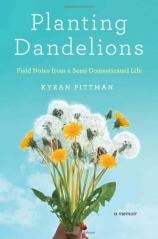Reading Group Guide
Discussion Questions
Planting Dandelions: Field Notes from a Semi-Domesticated Life

1. In the introduction, the author argues that domestic life can be just as life-altering and awesome as more exotic experiences --- that “the path that winds through the backyard, can be just as meaningful and wondrous as the one that goes up the mountaintop.” Do you agree? Do depictions of family life in popular culture tend to support or refute the author’s claim?
2. Kyran and Patrick’s love story begins while she is married to someone else, “a gentle and kind man,” whom she abandons, for life in a foreign county with a man she met on the internet. Did that revelation elicit judgment or empathy from you, initially? How do those circumstances color the author’s credibility in writing about marriage and commitment?
3. In describing pregnancy and child-rearing, the author grapples with romantic expectations about motherhood that are both cultural and self-inflicted. Eventually, she concludes that her children can be at the center of her life, without being “expected to occupy the whole of it.” Where do you see the distinction?
4. The chapter, “Ring of Fire,” describes a difficult period in Kyran and Patrick’s relationship, triggered by an unexpected pregnancy. “As hard as it was to stay in my marriage,” writes the author, “it seemed a whole lot harder to get out of it. That, right there, is the whole point of marriage as an institution.” She argues that the binding infrastructure of marriage is a good thing; that “there’s something to be said for sealing off the exits.” Do you agree with her? Do you think people tend to give up too soon in relationships, or do you feel life is too short to endure unhappiness for very long? Does your opinion change depending on whether there are children to consider?
5. The author writes that her husband, and most men of his generation who grew up in the sixties and seventies, are “having to improvise modern fatherhood without any kind of useful precedent.” When Patrick claims that’s he’s already a hundred times more involved with his children than his father was with him, Kyran is sympathetic, but tells him,“it’s still not enough.” What do you observe about the evolving role of fathers? Is the gap closing between men’s and women’s expectations of dads?
6. “The Rearview” is about the author coming to terms with her mother’s and father’s limitations as parents, in the course of raising her own children. Was there a particular moment when you first saw your parents as people? If you have children, has raising them changed the way you saw your own childhood and the strengths or weaknesses of your parents?
7. The author’s feelings about the United States changes gradually but profoundly over the course of the book. How does the trajectory of her relationship with America run parallel with that of the love affair that lead her there?
8. In “The Crush,” the author describes how a seemingly harmless extramarital flirtation sparks an intense infatuation. Do you think it’s possible to indulge an extramarital attraction without consequences? Where is the line of fidelity crossed --- in thoughts and feelings, or only in deeds? Have you ever disclosed an outside crush to your mate? Would you ever? What would be the risks and benefits of doing so?
9. “Youthful sex appeal is a hefty talking stick in our culture,” the author states, in “Goodbye, Girl.” Do you agree with her fear that women become invisible with age? Name some women who defy it.
10. In the epilogue, the author writes that “nested within our collective story, there is also my story, a story about what it means to belong: to a family and a place, and still, to one’s self.” Where are you in your own story of belonging?
Planting Dandelions: Field Notes from a Semi-Domesticated Life
- Publication Date: April 28, 2011
- Hardcover: 256 pages
- Publisher: Riverhead Hardcover
- ISBN-10: 1594488002
- ISBN-13: 9781594488009







